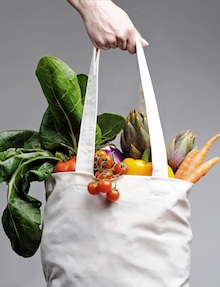By Andrew Huff
A simple query can be enough to dissolve an ethical barrier.
In 1890, Jacob Riis’s photojournalistic sojourn to New York City’s slums led to his documentation of “How the other half lives” at the margins of both city and society. Housing reform ensued as the city’s most affluent, nestled within their own shelters, could no longer cry ignorant of those without.
Today, the collegiate Food Recovery Network (FRN) has recognized that to understand how the other half lives depends on understanding how the other half eats—or doesn’t.
Like Riis, it examines the ethics of an ostensibly neutral act: eating on one’s college campus. In doing so, it has uncovered the disturbing reality that pockets of hunger in our communities exist alongside food surpluses in college dining halls.
A single meal swipe becomes a socially charged act of either altruism or carelessness in a nation where nearly $165 billion in food ends up wasted annually (“Americans waste, throw away nearly half of food: study”). Not only does the food remain uneaten, it also accumulates: according to the EPA’s most recent data on the issue, thrown-out food accounted for nearly 15% of all municipal solid waste in the United States in 2011 (“Municipal Solid Waste”).
Meanwhile, the EPA also noted that nearly 15% of all US households in the same year were classified as “food insecure” (“Food Recovery Challenge”).
The FRN, a 501(3)(c) non-profit originally founded at the University of Maryland College Park in 2011, mimics Riis’s distinctly local approach to social justice. Affiliated college students collect the surplus perishable food from their respective dining halls and deliver it to nearby homeless shelters.
The labor is voluntary and no money is exchanged. The only direct cost associated with the work is the purchasing of clear aluminum trays for food delivery, averaging about $0.10 per meal (“Launching a Food Recovery Network”). As a result, shelters can restock economically while students gain a visceral image of poverty in their communities; like the “other half” of Riis’s world, the marginalized gain visibility.
According to its online autobiography, the FRN has recovered more than 250,000 pounds of food since its founding (“Food Recovery Network: Frequently Asked Questions”). Currently, it operates through 17 established college chapters with 25 more in development nationwide (“Food Recovery Network: Chapters”).
In creating the network, the original University of Maryland chapter synthesized the food justice innovations undertaken at the campuses of the three other co-founding schools: Brown University, UC Berkeley, and Pomona College. All four are home to chapters of Phi Beta Kappa.
Brown University’s dining hall notes on its webpage that it has conducted an annual meal credit event where students may donate dining hall meals to underprivileged community members. Meanwhile, the Bare Abundance project at the University of California, Berkeley pairs nutrition education programs with distribution of excess dining hall food in West Oakland. At Pomona College, the Food Rescue group worked exclusively with one community homeless shelter and later developed a partnership with the Salvation Army.
The fusion of these individualized efforts into a national network has provided a liberal-arts-like dynamic of cross-fertilization of ideas from unique localities. The FRN central office also offers new chapters a letter from the University of Maryland Dining Services that articulates the advantages to colleges and communities of engaging in collegiate food recovery, in addition to funding $500 to kick-start their work (“Launching a Food Recovery Network”).
Its work presents a more literal interpretation of Phi Beta Kappa Secretary John Churchill’s call for “the application of the fruits of scholarship and research” toward the improvement of communities (“A Message From John Churchill”). The Food Recovery Network heeds this message by starting with the physical food that sustains scholarship in the first place.
In doing so it channels Jacob Riis’s muckraking to remind us that our own abundance should not blind us to the hunger in our communities. How the other half eats, or doesn’t, is a question we must ask with every meal swipe.
Andrew Huff is a senior at Goucher College majoring in Political Science. Goucher College is home to the Beta of the Maryland Chapter of Phi Beta Kappa.




